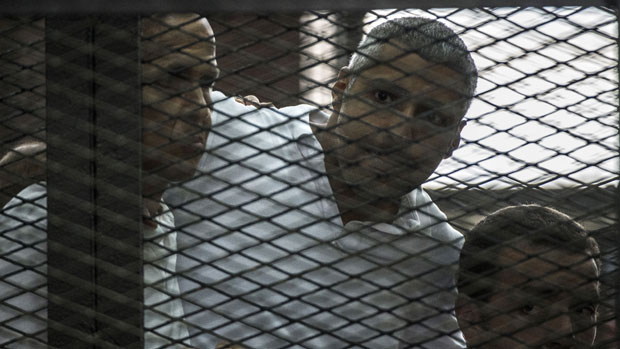Egypt sentences Al Jazeera journalists to seven years
Three reporters found guilty of supporting the Muslim Brotherhood and spreading false news

A free daily email with the biggest news stories of the day – and the best features from TheWeek.com
You are now subscribed
Your newsletter sign-up was successful
Three Al Jazeera journalists accused of supporting the Muslim Brotherhood and spreading false news have been sentenced to seven years in prison in Egypt.
In a case that caused international outcry, the journalists were detained in December and were among 20 people to be tried together, including six other Al Jazeera staff.
Today the court convicted Australian correspondent Peter Greste, Canadian-Egyptian bureau chief Mohammed Fahmy and Egyptian producer Baher Mohammed. All three denied the charges. Mohammed was sentenced to three extra years on a separate charge, while three other foreign journalists tried in absentia received ten-year sentences.
The Week
Escape your echo chamber. Get the facts behind the news, plus analysis from multiple perspectives.

Sign up for The Week's Free Newsletters
From our morning news briefing to a weekly Good News Newsletter, get the best of The Week delivered directly to your inbox.
From our morning news briefing to a weekly Good News Newsletter, get the best of The Week delivered directly to your inbox.
The Muslim Brotherhood, which supported Egypt's deposed president Mohammed Morsi, was listed as a "terrorist" organisation by the interim Egyptian government shortly before the accused were arrested.
In Egyptian media, the group on trial is known as "the Marriott cell", after the hotel where Fahmy and Greste were arrested. Five students with links to Islamist protests and the head of an Islamic charity were also tried alongside the journalists in what The Guardian describes as an attempt to portray them as "masterminds of a Muslim-Brotherhood-linked plot to smear Egypt's reputation".
The journalists and students say they never met each other before arriving at court for the first time in February.
BBC correspondent Christian Fraser says the evidence put forward in court did nothing to support the allegations. This included photographs from Greste's family holiday, a Sky Arabia report on cruelty to horses, a video of a press conference in Nairobi and a song by Australian singer Gotye.
A free daily email with the biggest news stories of the day – and the best features from TheWeek.com
Australian prime minister Tony Abbott appealed to Egyptian president Abdul Fattah al-Sisi for Greste's release. Abbott said he told Sisi that "as an Australian journalist, Peter Greste would not have been supporting the Muslim Brotherhood, he would have simply been reporting on the Muslim Brotherhood".
-
 The ‘ravenous’ demand for Cornish minerals
The ‘ravenous’ demand for Cornish mineralsUnder the Radar Growing need for critical minerals to power tech has intensified ‘appetite’ for lithium, which could be a ‘huge boon’ for local economy
-
 Why are election experts taking Trump’s midterm threats seriously?
Why are election experts taking Trump’s midterm threats seriously?IN THE SPOTLIGHT As the president muses about polling place deployments and a centralized electoral system aimed at one-party control, lawmakers are taking this administration at its word
-
 ‘Restaurateurs have become millionaires’
‘Restaurateurs have become millionaires’Instant Opinion Opinion, comment and editorials of the day
-
 Epstein files topple law CEO, roil UK government
Epstein files topple law CEO, roil UK governmentSpeed Read Peter Mandelson, Britain’s former ambassador to the US, is caught up in the scandal
-
 Iran and US prepare to meet after skirmishes
Iran and US prepare to meet after skirmishesSpeed Read The incident comes amid heightened tensions in the Middle East
-
 Israel retrieves final hostage’s body from Gaza
Israel retrieves final hostage’s body from GazaSpeed Read The 24-year-old police officer was killed during the initial Hamas attack
-
 China’s Xi targets top general in growing purge
China’s Xi targets top general in growing purgeSpeed Read Zhang Youxia is being investigated over ‘grave violations’ of the law
-
 Panama and Canada are negotiating over a crucial copper mine
Panama and Canada are negotiating over a crucial copper mineIn the Spotlight Panama is set to make a final decision on the mine this summer
-
 Why Greenland’s natural resources are nearly impossible to mine
Why Greenland’s natural resources are nearly impossible to mineThe Explainer The country’s natural landscape makes the task extremely difficult
-
 Iran cuts internet as protests escalate
Iran cuts internet as protests escalateSpeed Reada Government buildings across the country have been set on fire
-
 US nabs ‘shadow’ tanker claimed by Russia
US nabs ‘shadow’ tanker claimed by RussiaSpeed Read The ship was one of two vessels seized by the US military